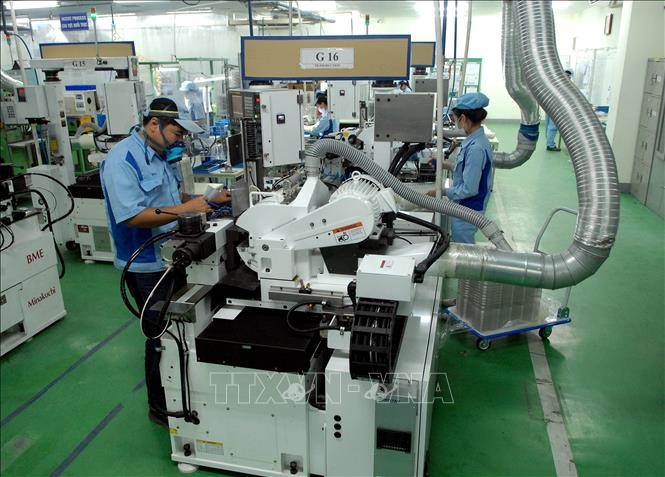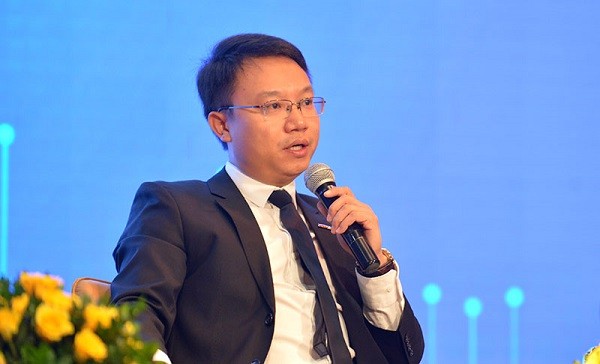(VOVWORLD) -In the first two months of this year, Vietnam’s public investment performed well, but private investment including both domestic and foreign direct investment is slowing down. The increase in realized investment capital from the state budget is a positive sign of improving socio-economic infrastructure and opens up prospects of high-quality capital attraction to Vietnam.
 The production line for electronic product components at Japan’s INOAC Vietnam Company at Quang Minh Industrial Park in Hanoi. (Photo: Danh Lam/VNA) The production line for electronic product components at Japan’s INOAC Vietnam Company at Quang Minh Industrial Park in Hanoi. (Photo: Danh Lam/VNA) |
As of February 20, an estimated 2.55 billion USD worth of FDI capital has been disbursed, down 5% from last year. This money went into 17 of 21 economic sectors, with processing and manufacturing receiving almost 2.2 billion USD, followed by real estate with 400 million USD.
The processing and manufacturing sector has the greatest number of new projects. Foreign investors are mainly investing in 39 provinces and cities nationwide. Bac Giang topped the list, followed by HCMC, Quang Ninh, and Dong Nai.
Do Thi Ngoc, Director of the Department for General Statistics and Dissemination of Statistical Information, said that realized investment capital from the state budget in February was an estimated 1.26 billion USD, up nearly 37% from last year. Realized investment capital in the first two months was 2.4 billion USD, 8.3% of the yearly plan and up 18.3% from last year.
“As of February 20, the total newly registered capital and adjusted capital of foreign investors was 535 million USD, the lowest in the 2019-2023 period. Realized FDI capital decreased 4.9% from last year, showing that the difficulties of the world economy have prevented foreign investors from expanding the scale of existing projects in Vietnam,” said Ngoc.
Economist Le Duy Binh, Managing Director of Economica Vietnam, a private consulting and research firm specializing in development economics, said the growth of public investment reflects great efforts by the Government, enterprises, and agencies and shows that capital management has been innovative.
But driving the national economy requires private investment as well, especially from the domestic private sector, and accelerating the disbursement of FDI capital in Vietnam, said Binh.
“Public investment has motivated private investors to make their own investment decisions. It plays an even stronger role if it can be used as a primer for private investors through a public-private partnership model,” according to Binh.
How to reverse this trend is a big question. Economists say that in addition to improving the investment environment, consolidating market confidence, and promoting entrepreneurship, Vietnam should outline measures to secure the market so that private investors who have participated in the market will continue to expand their investment while potential investors are ready to invest their money.
 Nguyen Hai Minh, Vice President of Eurocham Vietnam (Photo: diendandoanhnghiep.vn) Nguyen Hai Minh, Vice President of Eurocham Vietnam (Photo: diendandoanhnghiep.vn) |
According to Nguyen Hai Minh, Vice President of the European Business Association in Vietnam (Eurocham), European investors say that investing in infrastructure is a form of investment that attracts investment.
“Vietnam needs to pay more attention to planning and promoting the public-private partnership (PPP) model, in which the investment process should be especially transparent. No foreign investor has yet participated in the model, partly because the effort to attract PPP investment hasn’t offered sufficient incentives. European investors have great advantages and can support Vietnam in roads, logistics, energy systems, and green infrastructure to serve sustainable development,” Minh said.
The German Chamber of Commerce in Vietnam said that 93% of German businesses will continue to invest in Vietnam. Many even intend to move their production and trading activities from China to Vietnam.
This means that, while foreign investment attraction slowed in the first two months of 2023, in the long run capital attraction is still viable, because of Vietnam’s stable socio-political situation and improved macro policies with a long-term strategic vision.
Dao Thu Trang, Head of the Market Development Strategy Consulting Section of the German Chamber of Commerce in Vietnam, said, “German businesses have become more optimistic and have grown. That demonstrates the success of the Government’s policies in driving post-pandemic economic recovery and the health of the Vietnamese economy.”